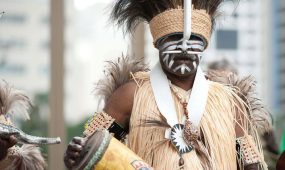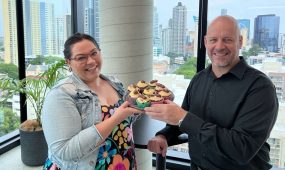Q&A with Climate Advocates Gillian King and The Rev’d Dr Graham Warren
Spotlight Q&A
Meet recently Commissioned Climate Advocates Gillian King and The Rev’d Dr Graham Warren and find out how they came to their Anglican faith, what projects they are working on, how others’ kindness has changed them and about their favourite childhood memories

Gillian King and The Rev’d Dr Graham Warren were recently Commissioned as Climate Advocates. In this Spotlight Q&A, they share about their work, faith, upbringings, hobbies and who inspires them and why.
Where do you currently live and where do you worship?
Gill: I have recently moved to Brisbane and was keen to try city living. I stayed in West End and have finally found long-term accommodation in the same area. I have been mainly worshipping at St John’s Cathedral.
The Rev’d Dr Graham: After 20 years of living away, most recently in Roma, my wife Imelda and I have settled back closer to family and friends in West End. After the busy parish life in the Roma district, it is strange but beautiful to worship at the Cathedral. The congregations could not be more different. From country conservative to cosmopolitan diversity, it is nice to know that at heart we are one.

I call this image ‘Our first date in Roma’, which was taken on the day we were Commissioned as Priests-in-Charge of St Paul’s, Roma
How long have you been involved in the Anglican Church and in what roles?
Gill: I am culturally Anglican and come from a family with a long history of being involved with the Anglican Church, including being largely responsible for building churches in places in which they settled, including one near Toowoomba. Immediately before coming to Brisbane I was living in Canberra, where I was a member of the Canberra-Goulburn Diocese’s Public Issues Commission and at various times had been on Vestry, a Church Warden, and organised some parish fetes. I come from farming stock and grew up in the Snowy Mountains.
Gill helping local Anglican priests in the Federal Seat of Canberra hand over the Community Climate Petition, which was initiated by Christian aid groups
The Rev’d Dr Graham: I began worshipping as a child at St Stephen’s, Coorparoo in the heady days of huge youth groups and vibrant church life, I have served the church as a Church Warden at St Paul’s, Cleveland and worshipped for years with the Brookfield community with Fr David Binns. I have also served as a parish priest, most recently in Roma.
What is the name of your current roles, including any voluntary roles, and what do your roles involve?
Advertisement
Gill: Graham and I are working as Climate Advocates across denominations in southern Queensland. We are helping Christians to come together, to speak up and to take action against further damage to our climate and on the consequences of damage already done. The aim is to establish a distinctly Christian voice on these matters, thereby carrying out our special role in caring for God’s creation.
The Rev’d Dr Graham: I currently have two roles. I am loosely attached to the Cathedral with a specific mandate to take the Gospel out into the public square. For the times as they are, the primary focus of this imperative is to awaken our church community to the responsibility to attend to the fifth Mark of Mission of the church, namely to care for creation. The imperative to address the climate situation is so great I have committed my primary energies to this task.
My second task is to support Imelda in her priestly ministry, and for the present that is to undertake an intentional transitional ministry in The Parish of Cooroora.
What projects and activities are you currently working on?
Gill: At the moment, I am concentrating on identifying and building relationships with key people and working out ways forward for our work.
The Rev’d Dr Graham: I have been invited to preach in a number of parishes and host a conversation about climate change for those gathered afterwards. Social science research has demonstrated that the most powerful transformative activity in which we can engage is conversation around the kitchen table, or around the parish fellowship table.
Advertisement
Being outside the parish politics allows me to raise difficult or contentious issues that may inhibit a parish priest who sometimes has to juggle conflicting pastoral sensitivities. When people are free to speak their fears, it is liberating for many to know that they are not indeed alone in their distress at the way the world has changed and is being changed by our disregard for the earth systems. Being Anglican, we are often too polite and hesitant in raising the contentious, but obvious, issues that we share. Climate change is one such issue.
What have been the highlights of your roles so far?
Gill: I have loved working with people who are so supportive and positive about our role and the Church’s place in our world and its role in effecting the changes needed for life as we know it to continue. I have experienced this from secular, as well as Christian, colleagues.
The Rev’d Jazz Dow, Justice Unit Coordinator Jen Basham and Gillian King singing carols at the 17 December St John’s Cathedral ‘Precinct Staff Christmass Service’
What have been the key challenges of your roles so far?
Gill: Starting a new role and being new to an organisation always brings challenges. In my case this is compounded by moving to a place that is new and quite different to me. I am settling into new routines and ways of doing things and wondering what Brisbane’s summer will be like for me.
What are your plans and goals for the next 12 months?
Gill: My goal is to have more people in Queensland speaking out and showing the way forward for taking action against further damage to our climate, on the consequences of damage already done, and for ensuring a fair (‘just’) transition for those whose livelihoods and ways of life are most affected by the changes needed – and doing so publicly and from a variety of Christian perspectives.
Can you tell us a little about your personal faith journey?
Gill: I came to the realisation a few years ago that I have been given life three times (birth, twice brought back from death) and so I must be here for a purpose. After a few years praying, I came to understand that my purpose is to bring together my broad knowledge, skills and experience to help engender deep cultural change so that people live in harmony with each other and with all creation and, in particular, take action regarding our damaged climate. A Canberra-Goulburn Diocese colleague’s recommendation of this position to me, combined with the timing with respect to what had been going on in my life and the broader world, meant this is clearly God calling me into this service.
The Rev’d Dr Graham: I grew up in a family that had no connection to the Church. In fact, my grandmother, the family matriarch, was a communist by political persuasion, but a suffragette feminist by personal persuasion. They were good people, but antagonistic to the Church. At the age of seven I had a visitation from beyond saying deliberately to me,” you belong to me.” Surrounding me were somewhat dysfunctional adults and family and so to know that I belonged somewhere was life changing. I asked to go to the local church and in spite of family resistance, I persisted. I always knew from that point on that “I belonged” and when one knows to whom one belongs, then all else is a footnote. Nothing since has shaken that sense that I belong and the grace that flows from that has kept me buoyant throughout life.
How does your faith inspire you and shape your outlook, life choices and character?
Gill: I follow the teachings and wisdom of Jesus because they are part of how I was brought up and they resonate with me and make sense to me intellectually. I try very hard to live my life with integrity, with my actions being consistent with my words and by showing respect and discharging my moral responsibilities to care for our common home, not harm others, to be fair, and to care for people who are vulnerable. It’s why I do what I do.
The Rev’d Dr Graham: Since an early age, I have been gifted with a faith that has rarely been shaken. My life in science and medicine only confirmed my deepest sense that we are children of God. The majesty of creation and the miracle of life are awe inspiring and my response to this is worship and service. I have always had an awareness that the Holy Spirit is as close to me as my own breath and so I am never alone in the cosmos. To know at this deep level that I belong and am loved grounds me in a way that allows me to be present as a witness to others. We belong in eternity. Eternity is not time going on forever, it is reality without time as a variable. We are spiritual beings enjoying a short, but beautiful, bodily experience and when that is complete, we return to our home in eternity. My life choice to be present in service in medicine was my response to the gift of life.
What is your favourite scripture and why?
Gill: I don’t know that I have a favourite scripture because what resonates can change with time and circumstance. If I really had to choose, then perhaps it would be a toss-up between Matthew 6:10b (because that sums up so much of faith teachings), “your will be done, on earth as it is in heaven” and 1 Corinthians 13.6-7 (because it is consistent with how I try to live my life), “Love does not delight in evil but rejoices with the truth. It always protects, always trusts, always hopes, always perseveres.”
The Rev’d Dr Graham: I have always found great comfort in the parable of the Prodigal and his Brother, as recorded by Luke (Luke 15.11-32). No matter how far we travel to escape the loving arms of our creator, we can never be put outside the embrace of belonging. So, in spite of ourselves we are loved beyond measure.
I also like the book of Job, as Job’s life sometimes resonates with mine. Job never doubts for one moment that he belongs and has enough confidence in this to challenge God to keep his side of the bargain. The story only makes sense when at the end God asks Job where he was when the world was created and God held all in the palm of his hand. Job is reminded by this of his true place in the created order.
What person of faith inspires you the most and why?
Gill: Bishop Neville Chynoweth seemed to me to embody what being Christian is – and a highly talented musician to boot.
The Rev’d Dr Graham: In my teens, I found my way to the Brookfield Friary when it was alive with the witness and presence of the Franciscan brothers. They lived a life of service taking in ex-prisoners helping them to reintegrate into society. When the AIDS epidemic struck it was the brothers who stepped up to care for the dying when others fled in fear. Since then, the life and witness of Brother Francis and all who call him their spiritual father inspires me. Francis grounds me in my work as an environmental activist.
What are the primary strengths of the Church and what is the best way to make the most of these for the benefit of our communities?
Gill: The Church has a long-standing – and potentially still powerful – position in our society, with a traditional role in leading on ethics, providing support during crises, and an ability to draw on deep spiritual, intellectual, moral and social resources. Demonstrating clear faith leadership, re-establishing a distinctly Christian voice in the public arena, and restoring community by connecting people through relationship with each other and with God are, I believe, essential to restoring the long-term habitability of Earth so that life as we know it can continue into the future.
The Rev’d Dr Graham: As the Body of Christ, we are the hands and feet of God active in the world transforming the unjust structures and caring for the creation. Only the church has such a wide and effective mandate to do this. To remind ourselves of this mandate is my calling. The church is a community of the faithful and as such is in marked contrast to the world with its hyper-individualism and materialism. The church is counter-cultural in every way.
What are the primary challenges currently encountered by the Church and what is the best way to overcome these for the benefit of our communities?
Gill: I think a primary challenge for the Church today is relevance to people, especially in a social context that is uncertain and increasingly focused on the individual and business interests and in the wake of child abuse and other scandals. Coming together, building and strengthening relationships and community, is the basis of the Church and our work as climate advocates.
The Rev’d Dr Graham: God is active in all the world and it is our calling to simply get out and join in. We have spent too much energy as a church looking inward and bemoaning the loss of status we have endured by our failing to be faithful. The church needs to actively engage with the world and be a voice for peace, reconciliation and transformation. I am glad to be alive at this time in history and I believe that rumours of the death of the Church are greatly exaggerated.
What is the kindest gesture you have ever experienced or witnessed?
Gill: Another tough question! A family friend kept watch over me in hospital while I underwent major surgery and then recovered from it and from dying briefly post-surgery. As one of my sisters says, ‘She looked after us when we were sick.”
The Rev’d Dr Graham: I was taken by delighted surprise when after some considerable time, Imelda and I were accepted by the Aboriginal people among whom we lived and worked. In spite of their enormous life challenges they had room to allow us into their lives. I was taken aback by their open generosity and hospitality.
What is the best piece of advice you have ever received and who gave you this advice?
Gill: “Listen to your inner wisdom.” I came to this advice sometime after my first child was born and it has helped me in times of uncertainty, conflicting advice and information, and overwhelm.
The Rev’d Dr Graham: From an early age I was taught that “a gentleman is someone who never causes anyone any trouble.” The best piece of advice I have been given was from Imelda who told me to take that monkey off my shoulder. Since then I no longer look over my shoulder to see if I am doing the right thing by everybody concerned. I now simply ask for the Spirit to be with me and guide my actions, choices and words.
What do you do in your free time to recharge and relax?
Gill: Walking, gardening, singing (or making any music), being with ‘nature’. As my Twitter handle used to say, I am a ‘musical permaculturalist’.
The Rev’d Dr Graham: I am a sculptor and I make craft furniture. I have a violin I am making, although it has been put in mothballs for the time as I mourn the passing of my daughter Sarah. It was to be a gift for her. I know that I am healing when I find myself taking the violin out again to continue the creation. I can be totally immersed in prayer for a day at a time when I am in my studio workshop alone with God. I love wasting time with God in that way.
The Rev’d Dr Graham working in his studio on a violin he is making for his daughter, Sarah
If you found yourself on a deserted island, what three things would you choose to have with you?
Gill: Hmmm – I have never thought about three things for my marooning before…
- A knife that is perpetually sharp and easily useable.
- A wok – stainless steel, so it could also be used as a reflector and solar cooker and wouldn’t rust.
- A Bible – because it is a library in one book, so has a lot of material with lots of variety (and inspiration!)
If you could have a billboard with any text on it, what would it say and why?
Gill: “Survival tip: respect each other and our one-and-only common home.” It’s true and is the gist of the end of my daily prayers.
What book have you given away most as a gift and why?
The Rev’d Dr Graham: I have bought and given away to family multiple copies of Bruce Pascoe’s Dark Emu. This Christmas every household in our large family will receive a copy of Young Dark Emu, written for children. This book more than any other has been transformative for me as an Australian. It puts me in my place in this fragile land to know what we have done to ignore and maltreat both the ancient people of the land and the fragile yet beautiful land itself that supports us all. It is a book to remind me of our hubris.
Where do you do your best thinking?
Gill: In bed when waking up or walking or gardening. Sometimes in the shower – when I was in a very complicated and highly stressful job, I used to solve a lot of problems there (and wanted to find a waterproof writing system so I would remember the answers!).
If you are having a bad day, what do you do to cheer yourself up?
Gill: Sing. Singing is a great remedy for all sorts of things.
Gill enjoys singing, here (back row, second from right) with A Chorus of Women performing ‘The People’s Passion’
What’s your best childhood memory?
Gill: I get nostalgic thinking about my childhood (particularly the places in which I grew up) – they were pretty care-free times and, as an adult, I have realised that I have a deep connection with the Snowy Mountains and Monaro. I am also nostalgic with anything that makes me remember or imagine our world as it used to be – and, as we see the consequences of damage to our Earth and society unfolding, this is a pretty frequent occurrence these days.
The Rev’d Dr Graham: We lived a life away from extended family for reasons I have never been able to understand. So, when as a child I went to visit my grandmother in Sydney and see a photo of me on her piano, I felt like I was part of something larger than the small nuclear family that had separated and lived apart. Needing to belong is a powerful human need. I was lucky that God intervened in my life at age seven and told me unequivocally that I belonged. That epiphany transformed my life and has remained with me ever since. When I know to whom I belong, then all else is a footnote to life.

